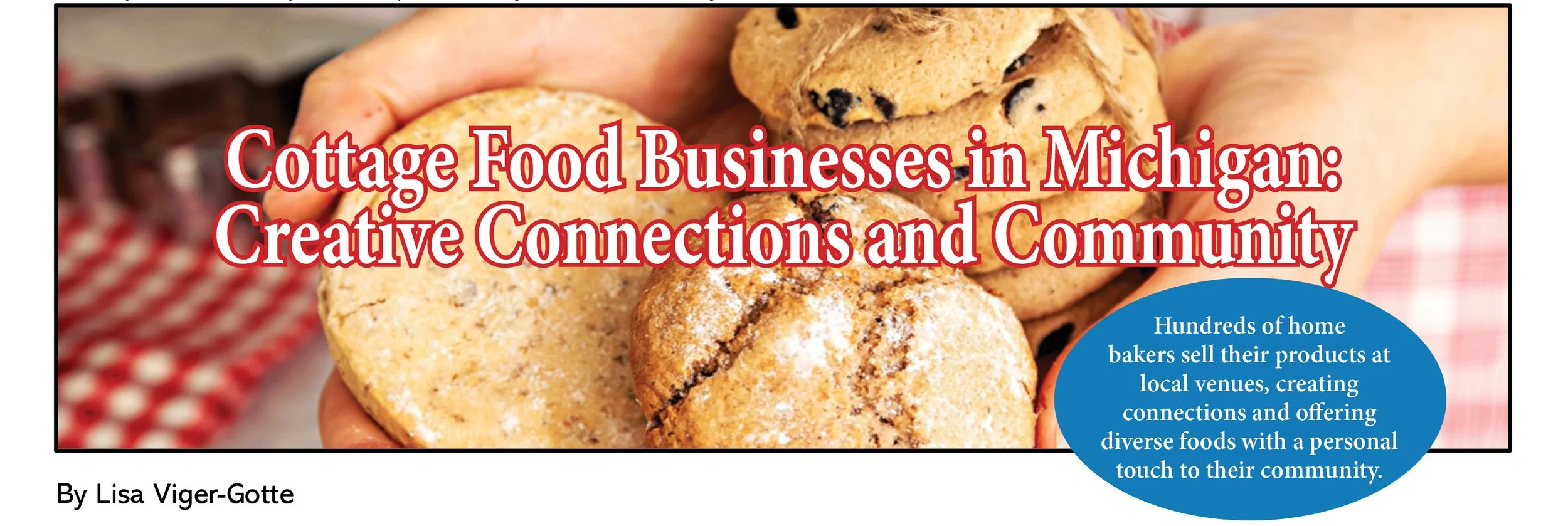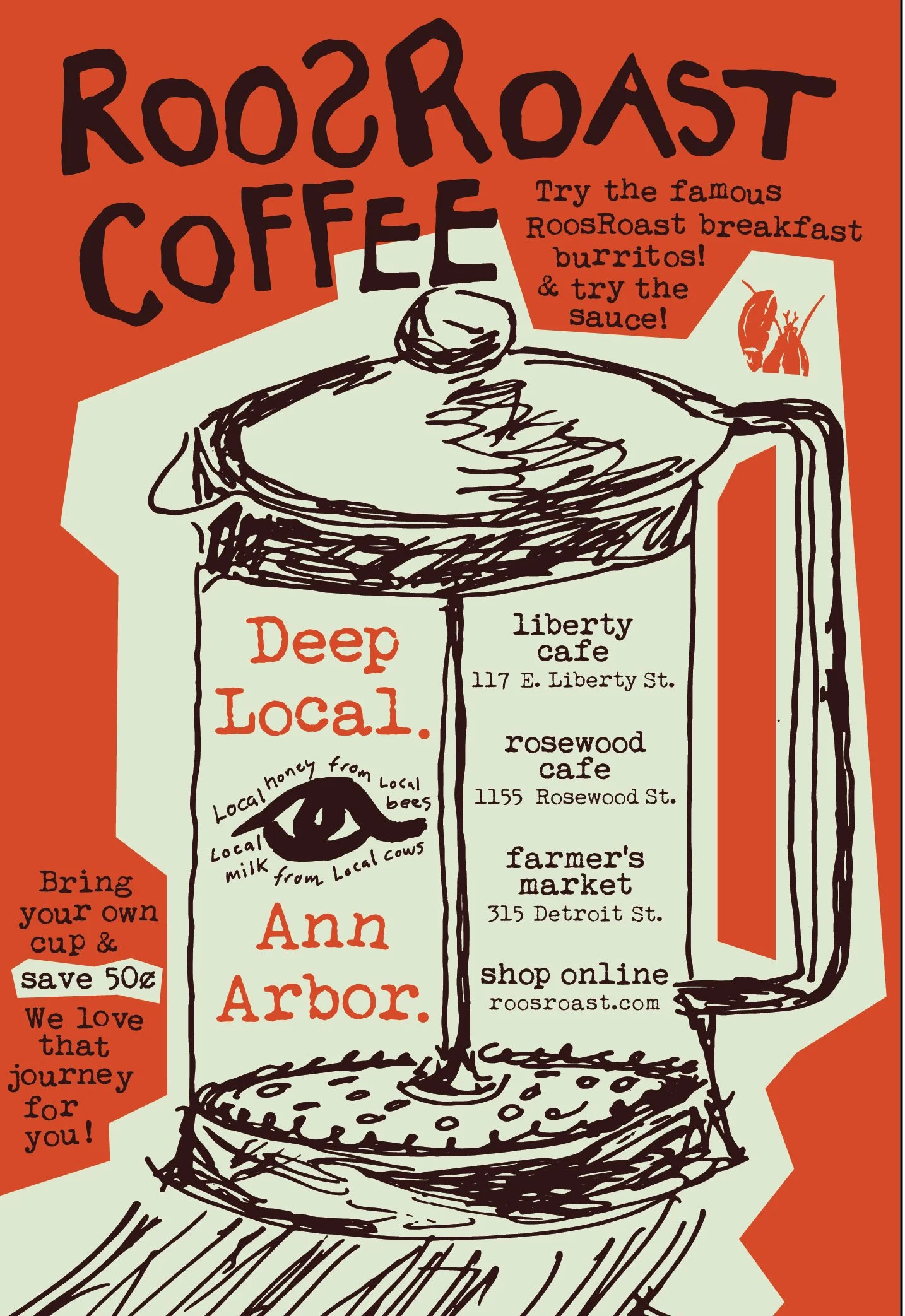Suzanne Murray’s love of all things French, combined with her partner Lisa Conlin’s dream of running a small business, led to the creation of their deliciously delightful cottage food venture, La Baguette. Murray and Conlin have baked French-inspired treats in their Ann Arbor home kitchen since 2010, when former Governor Jennifer Granholm created Michigan’s Cottage Food Law to help businesses like La Baguette operate with reduced regulatory barriers. They are familiar faces at local farmers markets and other events, where loyal customers have enjoyed their creations for years.
They’re not alone. Hundreds of home bakers sell their products at local venues, creating connections and offering diverse foods with a personal touch to their community.
What is Michigan’s Cottage Food Law?
Michigan’s Cottage Food Law allows small businesses to make and sell homemade foods from their home kitchens without cumbersome and expensive commercial licensing or inspections. Goodies like breads, jams, cookies, candies, granola, and more can be sold directly to consumers at farmers’ markets, roadside stands, and fairs. It can be a wonderful way to connect with the community.
There are some restrictions. The maker must not prepare food that requires refrigeration and label each item to show it was made in a home kitchen not inspected by the State of Michigan. Additionally, revenue cannot exceed $25,000 per year, and all sales must be in person. Online and wholesale sales are currently not allowed. In late 2024, House Bill 6131 proposed increasing the Michigan Cottage Food Law gross sales cap from $25,000 to $45,000 and later $50,000. While this hasn’t become law yet, it indicates continued growth and legislative interest in the cottage food sector.
Family inspired Shantal Hubbard, sells sourdough baked goods from her home in the country near Chelsea. “My youngest daughter and husband were both having some health issues that led me to learning about, and soon making, sourdough baked goods. Once I started, I soon realized how wonderful, delicious, and healthy homemade sourdough baked goods were.” Shantal soon started making enough to share with her extended family, friends, and then customers.
Look What I Made is the decorated cookie business run by Jessica Rickli from her home in Chelsea. Like many other home bakers, she uses social media to connect with her customers and let the community know what she has to offer. “I use Facebook to market to my clientele. I post pictures of all my orders and advertise my popup sales and website on there. I have also been able to sell my products at popups during our city’s street music festival that runs weekly during the summer.”
Word of mouth can be a great way to connect as well. Murray and Conlin appreciate the face-to-face interaction of farmers’ markets. “We’ve been very fortunate to have interacted with many friendly customers over the years. Getting to know our customers has been the highlight of owning a cottage food business since it requires that we sell directly to people. Responding to what our customers like is the most effective marketing for us. We also use the fact that we are selling at a farmers’ market and incorporate other vendors’ products and seasonal influences to appeal to customers. The French cachet adds an effective touch as does our enjoyment of repartee.”
Running a small business isn’t all cookies and baguettes though. There can be challenges as well. Murray and Conlin have weekly meetings to stay on top of what needs to be done. “We aren’t working with commercial-sized equipment, which means we can only bake a limited quantity at one time. We have to pace ourselves and stay organized to maintain control of our inventory and to be ready to arrive at the markets on time. Seeking ingredients and other necessities weekly from a variety of sources is a priority so that we never run out of any essential ingredients.”
Shantal Hubbard has also had challenges working in a smaller home kitchen. “One challenge I’ve encountered is how much I can produce on a bake day. I’m operating out of my home kitchen on an extremely part-time basis. The best way I have managed this is to limit the amount of orders I take per week so that I am able to fulfill all of them and produce high-quality sourdough baked goods.”
Jessica Rickli said, “Do your research first, and then if it still sounds like a good fit for you, do it! The Michigan Department of Agriculture and Rural Development (MDARD) has the information you need posted online, as well at online classes they offer. Also look into what ‘competitors’ there are in your area—sometimes you need to be the only one in your niche to be successful, and other times it can be beneficial to have a few businesses like yours around. I find what I am doing to be fun, beneficial, and rewarding, and I wish the same for all others interested in this path as well.”
Hubbard suggests doing what you love and use yourself. “Find something you enjoy and are already using or making for yourself or family. I would also recommend not putting too much pressure on yourself! You can take it as quickly or as slowly as you want and can grow at your own pace.”
How to Start Your Own Cottage Food Business
Do you love to bake, create, and engage with your community? Developing a Cottage Food Business might be for you! Here’s an overview of what you need to know to get started.
1. Understand the Cottage Food Law
Michigan’s Cottage Food Law (PA 113 of 2010) allows individuals to prepare and sell non‑potentially hazardous foods, such as baked goods, dry mixes, jams, candies, dried herbs, popcorn, and roasted coffee. These can be made in your primary home kitchen without a food license or inspection. However, foods requiring refrigeration or with alcohol are prohibited. Annual gross sales are capped at $25,000 per household.
2. Choose Eligible Products
Select foods that are shelf‑stable at room temperature and fall within allowed categories such as breads, granola, candies, jams, dried fruits, nut butters, and roasted coffee. Do not include restricted items like salsas, meat, cut melon or fruit, refrigerated items, or alcohol-infused confections.
3. Confirm Local Regulations and Business Setup
Although MDARD doesn’t require permits or licensing, it’s critical to review the Michigan Food Law and Food Code for definitions, adulteration, and packaging rules. Contact your city or county to check for local zoning, business licensing, or DBA requirements. Decide on your business structure (e.g., sole proprietorship, LLC) and tax obligations.
4. Prepare Your Kitchen
Your kitchen should be clean, hygienic, and free from pets, pests, and chemicals. Follow these safety steps to keep you and your customers safe. Sanitize countertops, utensils, and equipment, and use clean attire, including aprons, hair nets, and gloves. Prevent cross-contamination by using separate equipment for different foods and avoid preparing food while ill. Designate storage areas within your residence. Garages, sheds, or outbuildings are not allowed.
5. Complete Food Safety Training
Michigan State University Extension provides a free online course on Cottage Food Law Food Safety, covering production, packaging, transport, sampling, and recordkeeping. Although the course is optional, completing this builds consumer confidence and improves food safety by ensuring sellers adhere to safe food handling practices.
6. Package and Label Products Correctly
All cottage food must be prepackaged and labeled. Required label information includes business name and physical street address (no PO boxes) and product name. Complete ingredient list descending by weight, including sub-ingredients and net weight or volume plus metric equivalent. List common allergens like milk, eggs, nuts, soy, wheat, and fish. All products must be labeled with the mandatory statement: “Made in a home kitchen that has not been inspected by the Michigan Department of Agriculture & Rural Development.” This must be in at least 11‑point font and legible. If you’re selling items like wedding cakes that aren’t prepackaged, include required info on an invoice or box documentation.
7. Plan Sales Venues and Keep Records
Cottage food may be sold only in person, directly from farmers markets, roadside stands, fairs, and from home. You may take orders online or by phone, but the final exchange must be face-to-face. Mailing, shipping, consignment, wholesaling, retail sales, and third-party selling are prohibited. Be prepared to track sales, ingredient sourcing, and inventory. MDARD may request records, especially if sales approach the $25K cap.
8. Launch, Promote & Maintain Compliance
Market via your website, social media, and local events. Emphasize your homegrown, safe‑food story. Customers appreciate transparency. Keep your kitchen and transportation clean during events. Annually review business status, and if sales exceed $25,000, you must shift to a licensed commercial kitchen.
By understanding the law, selecting the right products, ensuring safe home production, labeling correctly, selling directly, and maintaining records, you can legally and successfully start a cottage food business in Michigan. If you need help along the way, contact MDARD at 800‑292‑3939 or MDA‑Info@michigan.gov.
Visit La Baguette’s website at labaguettea2.com. Look What I Made and Shantal Hubbard can be found on Facebook @lookewhatImadellc and @shantalhubbard. For more information on starting your own cottage food business visit michiganfoodsafety.com, mifma.org, or michigan.gov/mdard.








































































































































































































Recipes for Moon Milk and Harvest Lentil and Wild Rice soup. Winter Issue #91